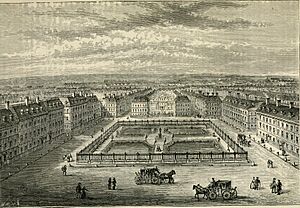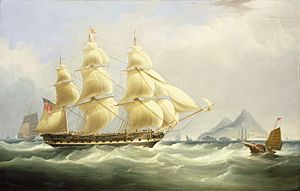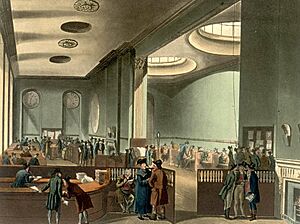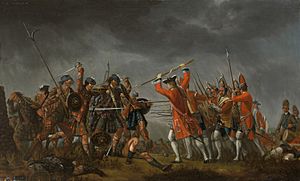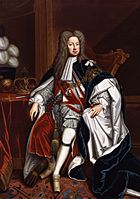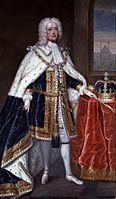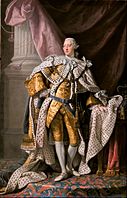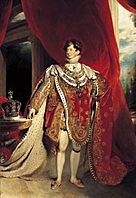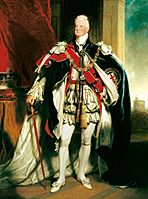Georgian era facts for kids
| 1714 – 1830 (1837) | |
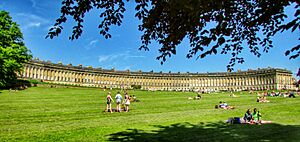
The Georgian architecture of the Royal Crescent in the city of Bath
|
|
| Preceded by | Stuart period |
|---|---|
| Including | Regency era |
| Followed by | Victorian era |
| Monarch | |
| Leader(s) |
Sir Robert Walpole
Lord Wilmington Henry Pelham Duke of Newcastle Duke of Devonshire Lord Bute George Grenville Lord Rockingham Lord Chatham Duke of Grafton Lord North Lord Shelburne Duke of Portland William Pitt the Younger Henry Addington Lord Grenville Spencer Perceval Lord Liverpool George Canning Lord Goderich Duke of Wellington Lord Grey Lord Melbourne Sir Robert Peel |
The Georgian era was an important time in British history. It lasted from 1714 to about 1830 or 1837. This period is named after four kings from the House of Hanover: George I, George II, George III, and George IV.
Sometimes, the short reign of William IV (who died in 1837) is also included. A special part of this era was the Regency era. This was when George IV ruled as a "Prince Regent" because his father, George III, was very ill. The Georgian era eventually led into the Victorian era, bringing new ideas in art and society.
The word "Georgian" is often used when talking about the history and buildings of this time. For example, you might hear about "Georgian architecture."
Contents
Arts and Culture in the Georgian Era
During the Georgian era, society and daily life were shown in many famous novels. Writers like Daniel Defoe, Jonathan Swift, and Jane Austen wrote about the people and their lives.
This period also saw amazing architecture. Famous architects like Robert Adam and John Nash designed beautiful buildings. The Gothic Revival style also became popular.
Romantic Poets and Artists
The arts truly blossomed with the rise of Romantic poets. These included Samuel Taylor Coleridge, William Wordsworth, William Blake, and John Keats. Their poems used rich, colorful language to express deep feelings and ideas.
Painters like Thomas Gainsborough and J. M. W. Turner captured the changing world of the Georgian period. Lancelot "Capability" Brown, a famous landscape designer, also created stunning gardens.
Many cities still have beautiful examples of Georgian architecture. These include Edinburgh's New Town, Georgian Dublin, and parts of Bath.
Popular music of the time included works by Handel, Haydn, and Mozart.
The Grand Tour
The "Grand Tour" was a popular custom for young, wealthy English men. They would travel to Italy, often through France and the Netherlands. This trip was for learning and experiencing different cultures.
It usually lasted a year or more. Travelers would bring back art, fashion, and new ideas to England. This helped spread new styles, like the "macaroni" fashion.
Social Changes in Britain
The Georgian era brought huge social changes to Britain. The Industrial Revolution began, which led to more distinct social classes. Also, new political parties, like the Whigs and Tories, started to compete.
In the countryside, the Agricultural Revolution changed how people lived. Small communities shrank, and many people moved to cities. A new transportation system began to develop. However, as jobs became scarce in rural areas, many people moved to Canada, the American colonies, and other parts of the British Empire.
Religion and Social Reform
In England, a religious movement called "evangelicalism" grew stronger. This movement encouraged a personal connection with God through Bible reading and prayer. John Wesley was a key leader, preaching to thousands and encouraging people to improve their lives. His followers later formed the Methodist Church.
Within the Church of England, an evangelical group called the "Low Church" also grew. Leaders like William Wilberforce worked to end slavery, stop dueling, and prevent cruelty to children and animals. They believed all people were equal in God's eyes, but they did not challenge the social structure of England.
The British Empire and Wars
The Georgian period was a time of constant warfare, mostly against France. Major conflicts included the Seven Years' War (1754–1763) and the American Revolutionary War (1775–1783). Britain also fought in the French Revolutionary Wars (1792–1802) and the Napoleonic Wars (1803–1815).
Britain won most of these wars, except for the American Revolution. In that war, the United States, France, Spain, and the Netherlands teamed up against Britain.
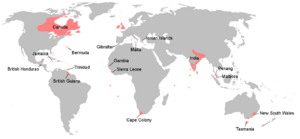
Losing the 13 American Colonies was a big blow for Britain. Many thought it meant the end of Britain as a major world power. However, Britain continued to fight France in the Napoleonic Wars for over 20 years. Britain used its strong financial system to support its armies and built a powerful Royal Navy to control the seas.
Victories over Napoleon at the Battle of Trafalgar (1805) and the Battle of Waterloo (1815) made Britain feel very strong and proud. These victories were led by Admiral Lord Nelson and the Duke of Wellington.
The British Empire also grew in Asia, mainly through the East India Company. Explorers like Captain James Cook used the Royal Navy to explore new lands, especially in Australia and the Pacific. Instead of trying to get back the American colonies, Britain focused on building a new empire in Asia. This "Second British Empire" became very strong in the later Victorian era.
Britain as a Trading Nation
The Georgian era was a time of great wealth for Britain. Business people expanded their trade all over the world. By the 1720s, Britain was one of the richest countries. Writer Daniel Defoe proudly called Britain the "most diligent nation in the world."
While other powerful countries focused on gaining land, Britain's main goal was to build a global trading network. This meant its merchants, manufacturers, and bankers could trade everywhere. To protect this trade, Britain needed a very strong Royal Navy.
The government helped private companies set up trading posts and businesses worldwide. These companies often had a monopoly, meaning they were the only ones allowed to trade in a certain area. Famous examples include the East India Company and the Hudson's Bay Company in Canada. The Royal African Company focused on the slave trade.
Britain's involvement in major wars often led to more trade opportunities. Even after losing the American colonies, Britain had a good trading relationship with the new United States. Britain also gained control of trade with India and dominated the profitable slave, sugar, and commercial trades from West Africa and the West Indies.
The main economic policy was Mercantilism. This meant the government and merchants worked together to increase power and wealth. The government protected its merchants with trade barriers and rules, and it supported local industries to boost exports and limit imports. The goal was to have more gold and silver flowing into London. Much of this money was spent on the powerful Royal Navy.
Most trading companies made good profits, and some people became incredibly wealthy from trade in India. However, there was one big financial disaster called the South Sea Bubble. The South Sea Company was supposed to trade with South America, but its real purpose was to manipulate the stock market. Its stock prices soared, making some people rich on paper, but then the "bubble" burst, ruining many investors. Investigations showed that even high-ranking officials, including the king, were involved in bribes.
The Enlightenment in Britain
The Enlightenment was a period of new ideas and thinking. Historians have studied how it affected Scotland and America, and whether there was a distinct "English Enlightenment."
Scottish Enlightenment
The Scottish Enlightenment was a group of thinkers like David Hume and Adam Smith. They were friends who often discussed new ideas. Education was very important in Scotland, especially at its four universities.
This movement valued human reason and rejected ideas that couldn't be proven by logic. In Scotland, the Enlightenment focused on practical benefits for individuals and society. Fields like philosophy, economics, history, and medicine made great progress.
English Enlightenment
Some historians debate if there was a clear "English Enlightenment." However, England had many important thinkers like John Locke and Isaac Newton.
After the 1720s, England had thinkers who were just as brilliant as those in France. These English thinkers, like Edward Gibbon, were often more traditional and supported the existing social order. This was because England had already accepted ideas like political freedom, scientific thinking, and religious tolerance. Coffee houses became popular places for people to discuss these new ideas.
Science and Medicine
British scientists made many important discoveries. Joseph Priestley studied electricity. Chemist Henry Cavendish found hydrogen in 1772. Daniel Rutherford discovered nitrogen in 1774, and Priestley also found oxygen.
In medicine, Lady Mary Wortley Montagu introduced inoculation against smallpox in 1717, which became widely used. Many new hospitals were founded, such as Guy's Hospital in 1721 and the Royal Infirmary of Edinburgh in 1729. Hospitals for people with mental illness were also established.
End of the Georgian Era
Historians disagree on the exact end date of the Georgian era. It's usually marked by the death of George IV in 1830 or William IV in 1837. Changes in culture and society happened at different times. For example, Romanticism in literature began around the 1780s.
By the late 1800s, people in the Victorian era often looked back at the Georgian period with disapproval. They sometimes saw it as a time of great wealth but less moral and spiritual depth.
Timeline of the Georgian Era
- 1714
- Queen Anne dies. George Louis, Elector of Hanover, becomes the new king, George I. This starts the House of Hanover's rule over Britain.
- 1715
- The Whig Party wins the election and becomes the main political party until 1760.
- 1727
- George I dies. His son, George, Prince of Wales, becomes George II.
- 1745
- The last Jacobite uprising is crushed at the Battle of Culloden in 1746.
- 1760
- George II dies. His grandson, George, Prince of Wales, becomes George III.
- 1763
- Britain wins the Seven Years' War. The Treaty of Paris gives Britain control over many new lands worldwide.
- 1765
- The Stamp Act is passed, causing anger in the Thirteen Colonies in North America.
- 1769–1770
- Australia and New Zealand are claimed as British colonies.
- 1773
- The Inclosure Act 1773 is passed. This act changed land ownership and led many poor people to move from the countryside to cities.
- 1775
- The American Revolutionary War begins in the Thirteen Colonies.
- 1776
- The Thirteen Colonies declare their independence from Britain.
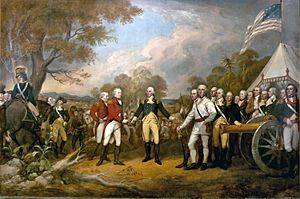
- 1777
- The main British army under General Burgoyne surrenders at Saratoga. France increases its help to the Americans.
- 1778
- France allies with the United States and declares war on Britain. Spain and the Netherlands also support France.
- 1781
- The British Army in America surrenders at Yorktown, Virginia.
- 1783
- Great Britain officially recognizes the independence of the 13 American States in the Treaty of Paris.
- 1788
- Australia is settled as a penal colony (a place for prisoners) in New South Wales.
- 1801
- The Act of Union 1800 creates the United Kingdom of Great Britain and Ireland.
- 1807
- The Abolition of the Slave Trade Act makes the slave trade illegal throughout the British Empire. This was largely due to the efforts of William Wilberforce.
- 1811
- George, Prince of Wales, becomes the regent for his ill father, George III. This period is known as the Regency era.
- 1815
- Napoleon of France is defeated at the Battle of Waterloo by forces led by The Duke of Wellington.
- 1819
- The Peterloo Massacre occurs, where cavalry charged into a crowd of peaceful protesters.
- 1820
- George III dies. His son, George, Prince Regent, becomes George IV.
- 1830
- George IV dies. His younger brother becomes King William IV. Some historians consider this the end of the Georgian era.
- 1833
- The Slavery Abolition Act is passed, ending slavery throughout the British Empire.
- 1837
- King William IV dies, ending the Georgian era. His niece, Queen Victoria, becomes queen, starting the Victorian era.
Georgian Monarchs
See also
 In Spanish: Época georgiana para niños
In Spanish: Época georgiana para niños


